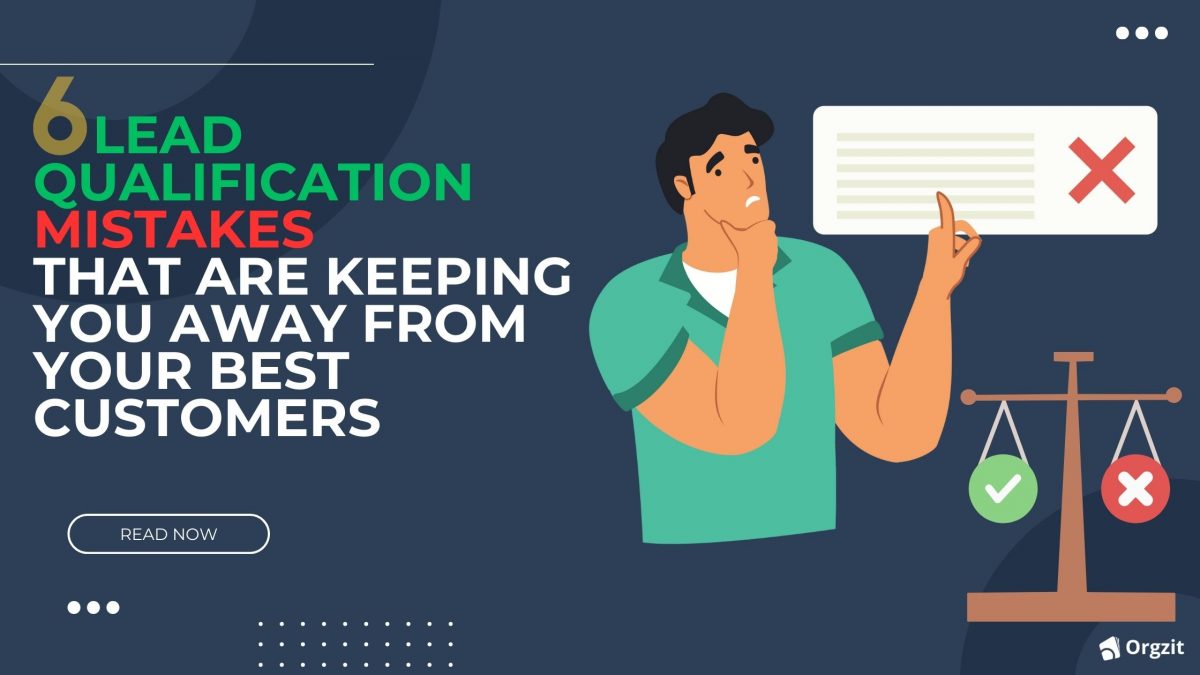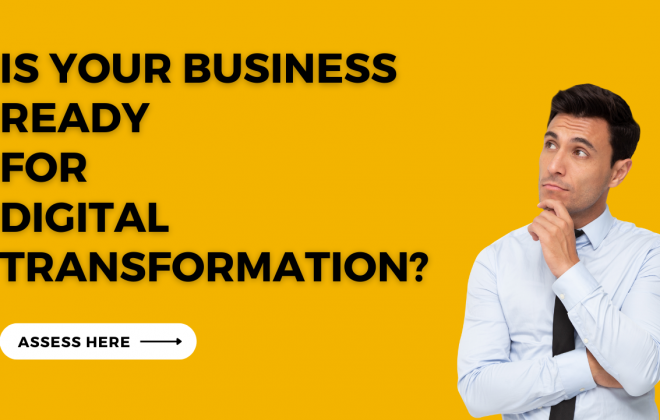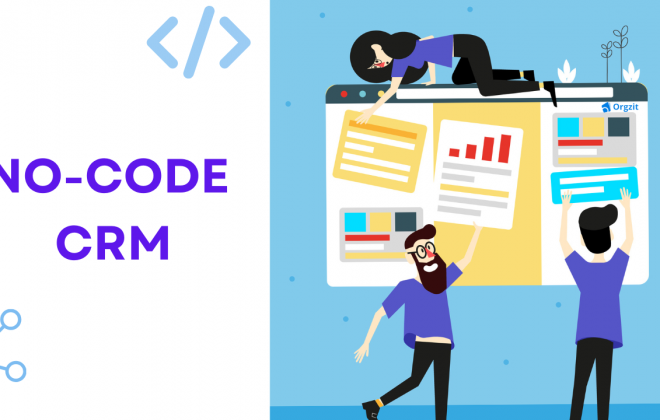6 Lead Qualification Mistakes That Are Keeping You Away From Your Best Customers
For a moment, imagine you’re at an industry event, talking with a prospect who appears to be really interested in what you offer.
They reconfirm their interest by inquiring how your machines might be customized and incorporated into their production process.
You are delighted about this new opportunity to work with this prospect. However, as the conversation progresses, it becomes clear that they are not the ultimate decision-maker
They’re simply gathering information without the authority to buy.
This is just one problem among the pool of problems that businesses face daily.
In this article, I am going to walk you through Lead Qualification – the answer to many sales problems.
What is Lead Qualification?
Before unraveling the problems, let us first understand what lead qualification is.
Lead qualification is the process of evaluating and scoring your potential customers based on their fit, interest, financial ability, and willingness to buy your product or service.
Lead qualification helps greatly save time, money, and resources. It does so by focusing on the leads that have the highest potential value and the lowest acquisition cost.
It helps you to segment your leads into different categories. This involves defining your target customers so that you only qualify those leads that will benefit from you and whom you can genuinely help.
In the end, everything comes down to creating value for your customers, helping them solve their problems, and achieving their goals and desires.
Why is Lead Qualification Important?
It’s crucial to understand that every lead you get is not the right fit for your business. It becomes very important to segregate the right-fit ones from the pool of leads that you have generated.
Before I explain the importance of lead qualification, let’s first understand the sales pipeline.
The sales pipeline is the series of steps that a prospect undergoes to become a customer finally. It includes lead generation, qualification, nurturing, and deal closure.
The second step in the sales pipeline – lead qualification – is the most crucial in determining the efficacy of the sales process and the productivity of sales reps.
Lead Qualification is crucial for the success of your sales efforts because:
- It streamlines the efforts of your company by helping to quickly catch and track the opportunities that are most likely to close quickly and help you meet this or next quarter’s targets.
- It drives more qualified leads into your sales pipeline than generic prospecting.
- It helps in targeting only those leads that are most likely to convert so that you spend less time on people who are not interested.
- It helps in selecting high-quality leads that can close with less sales effort, thus helping you reduce costs, allowing you to allocate resources more efficiently, and increasing your ROI from sales activities.
- It helps to collect useful information about leads, like their interests, buying habits, etc. This data can be used to understand better the mindset of the potential customer and their needs, which is valuable in improving the overall customer experience.
6 Mistakes That Are Keeping You Away From Your Best Customers
Now that we have grasped the importance of lead qualification, we will move on to some action and try to find loopholes in our sales process.
It’s tough to manage the needs of your existing long-term customers and to also focus on the new ones to grow the business. And mistakes are bound to happen.
But knowing some common mistakes and catching them early on can help you big-time.
And now that we have grasped the importance of lead qualification, it will be easier to spot these loopholes.
Let us look at some of the common mistakes that are guilty of driving your leads away.
- Not Defining Your Ideal Customer
The first and most important step in lead qualification is to have a clear understanding and a documented and agreed-upon definition of your ideal customer.
Defining your ideal customer can require deep brainstorming, but it is priceless to identify good fit and misfit customers in the sales process.
It’s like preparing a grocery list. When you go to the supermarket without a list, you end up buying a lot of unnecessary stuff, forgetting what you came for, and spending a lot more than you planned.
Buyer Persona is a technique to describe your ideal customer. Creating a buyer persona of your ideal customer will help you:
- better understand the needs of your target customers
- improve prioritization of leads
- increase your conversion rate
- boost sales reps’ efficiency
- Hesitating in Disqualifying Leads
It’s important to understand that disqualifying leads is not a bad thing. It’s natural to want to nurture every lead, but that’s not productive and will not help either your customer or you.
Not every prospect will be a good fit customer – it’s important to identify such prospects as early as possible so that you don’t end up wasting the precious time of sales reps working with the wrong kind of customer.
If you treat all leads equally and try to close every deal, you will be doing an exercise in futility and diluting your sales efforts.
Furthermore, every minute saved on a misfit customer is time that can be spent in forging deeper relationships with good-fit customers who are more likely to give you their business and can give bigger orders once they have a deeper relationship and trust with you.
So – do not fear that disqualifying some leads will narrow down your options. It works the other way around and will help you grow your business by serving the good-fit customers more deeply.
Focus your time and energy on leads that are more likely to buy from you – give them time, go out of your way to create value for them, and improve their buying experience.
- Not Asking Probing Questions
Asking probing questions in the process of lead qualification is very important to understand the mindset of the customer and get clarity on their needs.
Think back to the last time you went to see a doctor. What if the doctor made a diagnosis without asking you questions? Either the doctor will end up making the wrong diagnosis or leave some critical details behind.
This is exactly why your sales reps need to ask potential customers more questions before pitching their products or services.
Asking questions of prospects not only helps you understand their pain points, motivations, and objections, but it also builds trust. It shows that you are genuinely interested in understanding their problem and helping them.
Often, your questions to the potential customer create value for them by giving them further clarity about their needs and business goals.
To take this up a notch, you can try to ask them more specific questions about their needs, challenges, and desires and also tell them how your product is going to help them.
Some questions that you can ask the prospects are:
Q. What business challenges do you want to solve with our product?
This will uncover your customers’ pain points and give you an idea of their expectations and whether you can help them.
Q. Have you tried to solve the problem before? How did that go for you? Did it work for you?
The prospect may have tried to solve the issue in the past, but it did not work for them.
Asking this question can reveal whether you are capable of solving their problem or not.
Alternatively, it will also tell you what exactly you need to pitch to so that it just hits the right spot.
Q. What is the typical process in your business to buy a product/ service, like our procedure for approving a purchase?
This will give you a fair idea of the stakeholders involved in approving the purchase and who the ultimate decision maker is. It will also give you an indication of how long it might take to close the deal and get paid.
Q. Have you set aside a budget for this project?
Asking this question helps to judge whether a prospect is worth pursuing or not.
Your offering price and the prospect’s budget should fall in the same line.
If not, it is not worth moving forward.
- Not Following Up With Your Customers
There are some instances where you qualify a prospect from your end but don’t hear back from them.
You are sure that you can provide them with what they want, but they don’t feel the same. And you might end up losing your ideal prospects.
Thus, following up with your qualified prospects becomes important.
Some follow-up questions could be:
- Is our product/service working well for you?
- Were you able to solve your issue after using our product?
- Do you need any demos /training sessions?
- Do you need any help with customization?
Follow-ups help you build rapport with your prospects and show that you are genuine and can be relied upon.
Most of the time, we forget about following up with qualified prospects because we don’t have a proper planner.
CRM software such as Orgzit can help you track and schedule follow-ups efficiently.
- Not Having a Set Strategy
While it’s important to make trials and errors in the sales and marketing world, it is equally important that you don’t apply random tactics to your audience.
Having a clear sales process and a sales pipeline in place is important, as it saves your time and energy.
Setting up a strategy will take some time as it involves a lot of exploration, but you can get help from Lead Qualification Frameworks, which are a set of instructions and rules for salespeople to use when qualifying leads.
There are mainly five lead qualification frameworks:
- BANT – Budget, Authority, Needs and Timeline
- MEDDIC – Metrics, Economic Buyer, Decision criteria, Decision process, Identification and Champion
- CHAMP – Challenges, Authority, Money and Prioritization
- GPCTBA/C&I – Goals, Plans, Challenges, Timeline, Budget, Authority, Negative Consequences and Positive Implications
- FAINT – Funds, Authority, Interest, Need and Timing
You can learn more about lead qualification frameworks here.
- Not Having a Lead Scoring System
Assigning some numerical value to your leads will efficiently help you qualify them.
It will help you efficiently prioritize the leads.
You will not have to follow your intuition anymore, and it will make the decision-making process much easier.
Some benefits of lead scoring are:
- Increased sales efficiency
- Higher conversion rates
- Revenue forecasting
- Better sales and marketing alignment
Read more about the best lead-scoring software here.
You can also make your life much easier with Orgzit’s auto-score lead based on qualification criteria.
Summing Up
In conclusion, lead qualification is critical for businesses to quickly identify and prioritize new clients based on their suitability for the company’s offers.
However, frequent blunders can hamper this process, such as:
- failing to define your ideal customer
- being hesitant in disqualifying leads
- failing to ask probing questions
- not following up consistently
- not having a strategy
- not having a lead scoring system
Businesses can optimize lead qualification procedures by implementing a coherent strategy and a methodical approach, which can result in growth and success.
To help you address these issues and establish a lead qualification process aligned with your business goals, Orgzit CRM provides customized solutions for acquiring, tracking, and scoring leads.
Transform your leads into loyal customers with our tailored solutions. Schedule your free consultation now!
Your Questions Answered
Businesses can ensure effective lead qualification by aligning sales and marketing teams, setting clear qualification criteria, and utilizing lead-scoring methods.
Key indicators include budget alignment, decision-making authority, specific needs or pain points, and readiness to engage with sales.
Lead qualification should be an ongoing process, as customer needs and behavior can change over time, requiring continuous evaluation and adjustment.
By using lead scoring models, businesses can prioritize leads based on their likelihood to convert, ensuring efficient resource allocation.
Best practices include leveraging automation tools, integrating CRM systems, personalizing communication, and leveraging data-driven insights to enhance lead qualification strategies.









